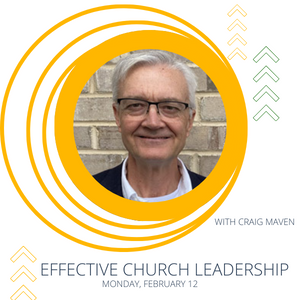
iCLT News: Effective Church Leadership
by Craig Maven
Minister of Administration and Church Relations
Webinar
Monday, February 12, 7pm
Gain insight helpful principles in getting pastors, lay leadership, and church members in a more harmonious working relationship where ministry grows.

Effective Church Leadership
How well is your church leadership working? Who is responsible for what in your church? Are there clear lines of communication and decision making? Who casts vision? Who carries the vision? Where does accountability lie? And who is accountable to whom?
Maybe you have never thought much about these questions, but ineffective church leadership promotes ineffective ministry. There are a few key principles that help move church leadership towards effectiveness.
- Vision. George Barna defined vision as “articulating a preferable future.” If your congregation does not have a clear idea of what the preferable future is how will it ever know if it’s on the right path? Vision can arise in multiple ways. Visionary pastors have the gift to lay out where the church should go. And visionary leaders work diligently to get there. Vision can arise from the congregation or key lay leaders. This is often done through a visioning process. Vision not only identifies what the congregation does, but also what it does not do. The easiest way to lose vision is to try and do too many things just because these are good programs to run. Bishop Leslie Francisco of the interim Conference Leadership Team (iCLT) is a great resource for visioning.
- Clearly define the role of lay leadership. Whether you have a church board, church council, board of elders or deacons, the role cannot be fuzzy. I’ve experienced to many times lay leadership spinning its wheels when significant ministry is within reach. Effective lay leadership’s role is to set ends. What I mean by that is clearly identify outcomes that can be qualified and quantified. Let’s say the vision is to be a community church that directly impacts 10% of the people who live in a 3 miles radius of your building. The defined outcome is that families will experience welcome and genuine care. That is where the role of lay leadership ends. The temptation is to define the outcome programmatically. Such as: “Hometown Mennonite will have children’s Sunday School.” What if this is not the most effective way to welcome families and show genuine care? Programmatic goals can be easily assessed but may not move the church toward its vision. Lay leadership’s role is articulate the desired outcomes and then hold staff accountable to work towards achieving those desired outcomes.
- The pastor’s role. The pastor’s role is to take the vision and desired outcomes, design the ways to work towards those outcomes, then recruit, train and support the people in the work. Returning to our above example. If the outcome is defined as Children’s Sunday School, staff will diligently set up Children’s Sunday School. But if the community you are in is not culturally attuned to Sunday morning worship parents will not bring their children. Maybe a Kids Club or after-school program is a better way to deploy limited resources. Staff designs the means to the outcomes and reports on progress. Lay leadership monitors what staff is doing. And any good pastor(s) will be far more attuned to how successful the programs or initiatives are. If something is not successful staff can shut it down and try something else without having to go through the cumbersome process of getting lay leadership approval. Pastors really do want to be part of effective ministry. Pastors will blossom if released to be creative!
- The members/participant role is to support and engage. Vision is great. Clearly defined outcomes are wonderful. But if nobody cares and nobody is willing to get involved the church withers. I have found that when the pastor is able to invite people to embrace the vision, to see that their investment of time and money is accomplishing meaningful ministry that people engage.
I am not promoting a one-size-fits-all approach. Each congregation will be unique in how it designs leadership and decision-making process. I have found the above principles to be very helpful in getting pastors, lay leadership, and church members in a more harmonious working relationship where ministry grows.
I will be leading a webinar on effective church leadership on Monday, February 12, 7PM. You can register online a virginiaconference.org/events or click the registration link above.
Craig Maven
VMC Minister of Administration and Church Relations
